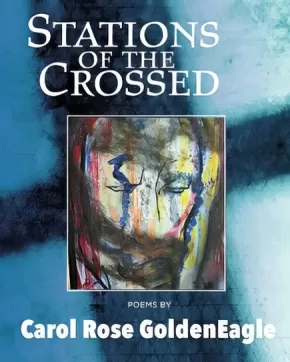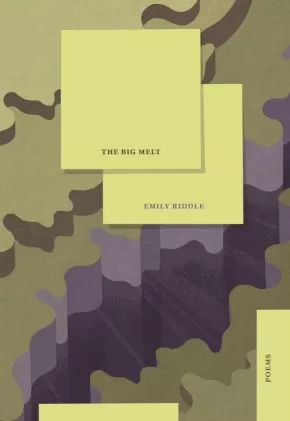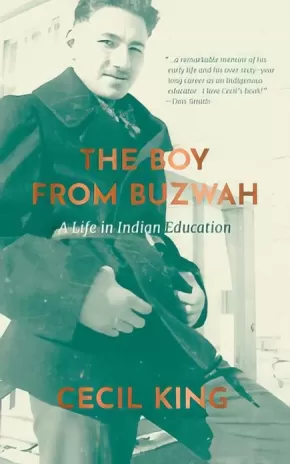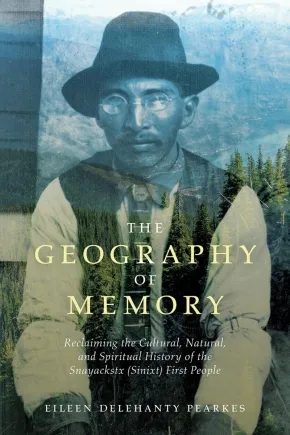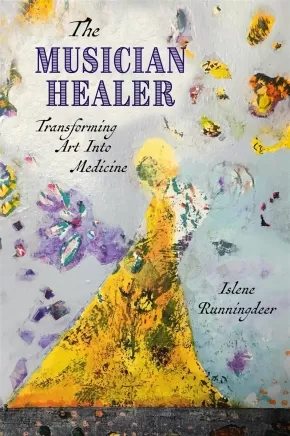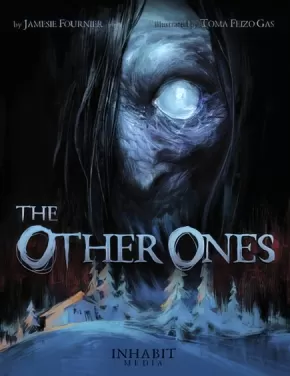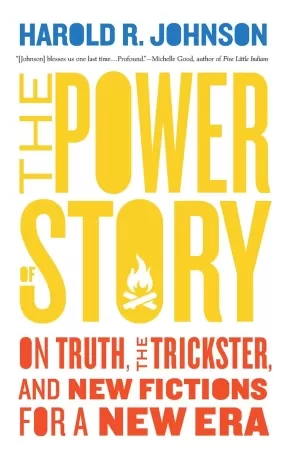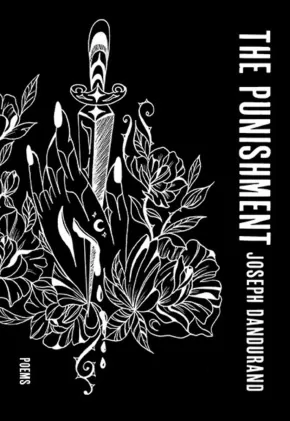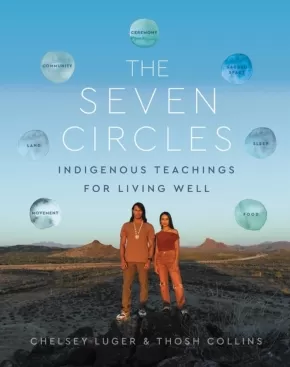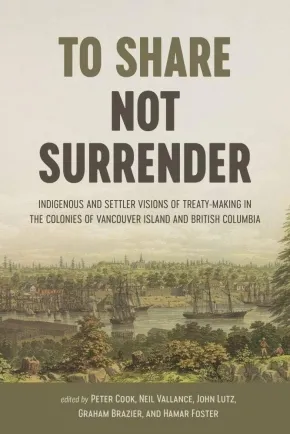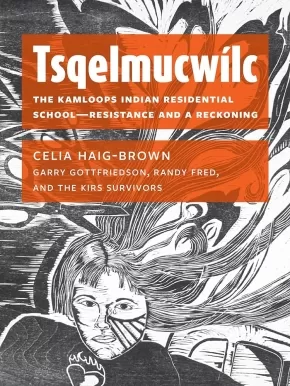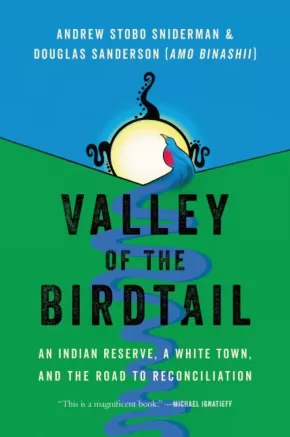
Indigenous Studies
421
-
435
of
1030 Results;
Sort By
Go To
of 69
Stations of the Crossed
$18.95
Format:
Paperback
Text Content Territories:
Indigenous Canadian; First Nations; Cree (Nehiyawak); Dene;
ISBN / Barcode: 9781771339421
Synopsis:
Synopsis:
When Carol Rose GoldenEagle was a child, attending Easter church services, she recalls the annual ritual of the priest presenting plaques depicting the stages of Christ's persecution to his resurrection, referred to as the "stations of the cross". Using these early teachings as a springboard for critical reflections, poems look back, but more importantly, look forward to reclaiming the gifts given by Creator within Indigenous culture. GoldenEagle's searing new poetry collection examines the dark legacy of the residential school system, church and government doctrine, and the ongoing impacts on Indigenous peoples' lives across Turtle Island.
Reviews
"Written with power and grace, Stations of the Crossed tells the story of 'doors marked in blood' from the point-of-view of a Sixties Scoop survivor, honouring those who 'survive because they have learned how.' If this book makes you cry, let it. These poems of blood-memory and soul, heartbreaking police brutality, and misconducts of the system have strength, humility, and wisdom, and are urgent reading for anyone interested in reconciliation."—Yasuko Thanh, author, Mistakes To Run With
"Stations of the Crossed takes apart this county's long history of trying to extinguish Indigenous culture, and the legacy of colonialism. Carol Rose GoldenEagle's own experience as a child of the Sixties Scoop is direct and especially moving. She replaces the Old Testament justifications with her own memories and reflections on community, and the ethical teachings and ways of being in Indigenous culture. It's been said if we only have one story, that's the story we become. This is a book about finding that new path, and the kind of story we need now-a true one."-Bruce Rice, author of The Vivian Poems: The Life and Work of Street Photographer Vivian Maier
Additional Information
100 pages | 6.00" x 7.50" | Paperback
The Big Melt
$19.95
Format:
Paperback
Text Content Territories:
Indigenous Canadian; First Nations; Cree (Nehiyawak); Plains Cree; Alexander First Nation (Kipohtakaw);
Reading Level: N/A
ISBN / Barcode: 9780889714366
Synopsis:
Synopsis:
The Big Melt is a debut poetry collection rooted in nehiyaw thought and urban millennial life events. It examines what it means to repair kinship, contend with fraught history, go home and contemplate prairie ndn utopia in the era of late capitalism and climate change. Part memoir, part research project, this collection draws on Riddle’s experience working in Indigenous governance and her affection for confessional poetry in crafting feminist works that are firmly rooted in place. This book refuses a linear understanding of time in its focus on women in the author’s family, some who have passed and others who are yet to come. The Big Melt is about inheriting a Treaty relationship just as much as it is about breakups, demonstrating that governance is just as much about our interpersonal relationships as it is law and policy. How does one live one’s life in a way that honours inherited responsibilities, a deep love for humour and a commitment to always learning about the tension between a culture that deeply values collectivity and the autonomy of the individual? Perhaps we find these answers in the examination of ourselves, the lands we are from and the relationships we hold.
Awards
- 2023 Indigenous Voices Awards Co-Winner for Published Poetry in English
Reviews
"Gentle, firm and funny, Emily Riddle uses The Big Melt to Aunty us all. This radically personal debut, like an iceberg or crater on the moon, reaches deep down into history—political, familial, environmental, romantical—to make sense of what it means to be an ndn on the prairies today who understands that the Oilers and West Edmonton Mall and miniskirts are sacred, and that this “bootlegging operation called Canada” can’t stop telling lies. There are truths here for us; the immense research behind the text feels like a lifetime labour of love, done out of necessity to reconcile loss and fashion some comfort in the face of colonial violence. What a gift it is for Riddle to show us, with clarity and wit, how fierce friendship and unshakeable matriarchs have helped her to connect with her ancestors, nehiyaw askiy, and herself." — Molly Cross-Blanchard, August 2022
"It is a thrill to read the work of a writer so generously astute and playful in their poetics. In The Big Melt, Emily Riddle calls us to attention, reciprocity and place with wisdom and tenderness. These poems return us to course, reminding us what it means to live connected to one another through Treaty and through care, before turning with a sly wink to expose the irony, the insecurity and the impermanence of settler colonialism. Deeply funny and conscious, The Big Melt roots us here together, asks us to hold on to one another, and to go on." — Jason Purcell, August 2022
"Emily Riddle's The Big Melt is an integral and intersectional addition to the Indigenous poetic arena and enters adorned with historic seedling and contemporary sapling. Riddle positions herself between Vancouver and Edmonton and untangles the breathing ecosystem of ancestor and knowledge that lie beyond the “depth of a plow.” Her poetics are aglow with unceded prairie treaties and decolonial praxes; here, buried settlers become “ndn land itself” and askiy is always animate—a becoming and an oncoming. We are continually reminded of the breadth of kin we are in relation with—she animates the land as being, allowing it to speak, and never forgoes its desires. From within burial trees, nehiyawewin emerges, from within the personal enters the political, and from within such a melting we find a series of unearthed birthings. Riddle never lets us forget that “the most important intimacies are never spectacular” but rather they are beyond any singular compound noun that English surely stole." — Joshua Whitehead, August 2022
"Emily Riddle's collection, The Big Melt, reads like a love letter to the prairies, Indigenous identity, heritage and love (both lost and found). In language both sharp and accessible, with no need to obfuscate with metaphor, Riddle reminds us that love letters are also written to cut deep when they must, to push back and to complicate, while demanding all the parts of us be seen. This is a collection for everyone who wants a little reality (and McDonald’s) with their rebellion." — Rayanne Haines, August 2022
Additional Information
112 pages | 5.50" x 8.00" | Paperback
The Boy from Buzwah: A Life in Indian Education
$29.95
Format:
Paperback
Text Content Territories:
Indigenous Canadian; First Nations; Anishinaabeg; Odawa (Ottawa);
Reading Level: N/A
ISBN / Barcode: 9780889778504
Synopsis:
Synopsis:
Cecil King’s remarkable memoir, from humble beginnings on a reservation to his unparalleled legacy to ensure Indian Control of Indian Education in Canada.
“Through my eyes, my community was creative, innovative and self-sufficient. In this remote northern traditional First Nation society, the skills, knowledge and abilities that the community needed to survive were all there. . . . The stories are not just of survival and hardship but of the power of the human spirit and the sheer natural genius of individuals.” — Cecil King
Cecil King grew up in the small settlement of Buzwah, Ontario, situated on Wikwemikong Unceded Indian Reserve on Manitoulin Island. This moving memoir shares King’s life on reserve in the 1930s and ’40s and describes a vibrant community full of interesting characters who shared knowledge, warmth, affection, and humour. King also describes his experiences attending Buzwah Indian Day School and St. Charles Garnier Residential School.
After furthering his education, King returned home to Buzwah as a teacher. He quickly became disillusioned with the Ontario curriculum and how inadequately it resonated with on-reserve youth and the realities of Indigenous life. It was then that King began his unparalleled legacy to ensure Indian Control of Indian Education in Canada.
King helped create curriculum that connected to traditional Indigenous cultures and established First Nation language courses in elementary and secondary schools. Over the course of his fifty-year career in education, he would found the Indian Teacher Education Program at the University of Saskatchewan, become the first director of the Aboriginal Teacher Education Program at Queen’s University, and develop Ojibwe language courses across North America.
A remarkable story about a remarkable man, The Boy from Buzwah is a powerful testament to Dr. Cecil King’s work and legacy.
Reviews
“A poignant reflective must-read memoir of an Indigenous educator whose life lived was Indigenizing and decolonizing western academies.” —Marie Battiste, author of Decolonizing Education and Honorary Officer of the Order of Canada
“Miigwetch Cecil King, for sharing your remarkable journey and life in this essential book, which educators and learners will treasure. This is a book of extraordinary generosity and humility, and one that provides both context and direction for the future of Indigenous education.” —Jesse Wente, author of Unreconciled
“An essential account of an Indigenous scholar’s trailblazing and sweeping contributions towards restoring and inspiring indigenous control of indigenous education.” —Verna St. Denis, University of Saskatchewan
“Cecil King’s memoir is an important contribution to the Indigenous literature, documenting early life on the Wikwemikong Unceded Indian Reserve, disclosing the enduring roots of Odawa tradition, chronicling the re-emergence of Anishnawbe culture and the rise of Indigenous activism, particularly in the important area of Indigenous education.” —Hon. Leonard S. Tony Mandamin IPC, Justice in Residence, Faculty of Law/Faculty of Native Studies, University of Alberta
“Cecil King has written a remarkable memoir of his early life and his over sixty-year-long career as an Indigenous educator. The teacher, respected community leader, and post-secondary professor and administrator, argues most convincingly for a system of First Nations education that incorporates fully Indigenous history, culture, and present-day realities. I love Cecil’s book!” —Don Smith, Professor Emeritus of History, University of Calgary
"Cecil King's book about his experiences in a day school, residential school, the bureaucracy and institutional development on Indigenous education presents an important perspective in the debate on educational change in the past half-century. His personal perspective and his use of Ojibwe as part of this history introduces a new qualitative dimension to this debate." —Keith Goulet, former Minister of Northern Affairs for Saskatchewan
Educator Information
King was one of the first to create curricula designed for Indigenous children and education programs to train Indigenous teachers and to establish some of the first Indigenous language courses in North America.
King understood that strengthening students’ cultural identity was key to their academic success and saw how the Canadian curriculum was not designed to do this.
Additional Information
356 pages | 5.00" x 8.50" | Paperback
The Geography of Memory: Reclaiming the Cultural, Natural and Spiritual History of the Snayackstx (Sinixt) First People - 2nd Edition
$30.00
Format:
Paperback
Text Content Territories:
Indigenous Canadian; First Nations; Salish; Interior Salish; Sinixt;
ISBN / Barcode: 9781771605212
Synopsis:
Synopsis:
A provocative, historical investigation into the displacement of the Snayackstx (Sinixt) First People of British Columbia’s West Kootenays.
This compact book records a quest for understanding, to find the story behind the Snayackstx (Sinixt) First Nation. Known in the United States as the Arrow Lakes Indians of the Colville Confederated Tribes, the tribe lived along the upper Columbia River and its tributaries for thousands of years. In a story unique to First Nations in Canada, the Canadian federal government declared them “extinct” in 1956, eliminating with the stroke of a pen this tribe’s ability to legally access 80 per cent of their trans-boundary traditional territory.
Part travelogue, part cultural history, the book details the culture, place names, practices, and landscape features of this lost tribe of British Columbia, through a contemporary lens that presents all readers with an opportunity to participate in reconciliation.
Educator Information
Please note that the author of this work is not Indigenous, but the text content is about the Snayackstx (Sinixt) First People. Shelly Boyd, Sinixt/Arrow Lakes Cultural Facilitator provides a Foreword.
In an Introduction to the work, the author notes: "First and foremost, every word of the story of their culture as presented here has been confirmed and accepted as true by the contemporary Sinixt.... Second, because the story also exists within a colonial context, it refers to written materials, published history and textual memories, information that was often recorded by the hand of non-Indigenous People but nonetheless reflects the knowledge of Indigenous generations.... The result is a tapestry, combining threads of history, ethnography, science and personal essays on the natural word.... Sinixit leaders, local historians, and academic experts review[ed] the text prior to publication.... Some non-Indigenous people criticized me for writing about Indigenous People at all, telling me it was not 'my story to tell.' This was, I realize now, a subtle form of silencing. While racism toward Indigenous People still exists across this culture, a groundswell of recognition has begun. In working alongside the Sinixt all these years, I have come to understand that integrating Indigenous perspectives into contemporary culture is not exclusively the responsibility of Indigenous People. As Shelly Boyd so aptly reminds all of us, we, the settlers, need to listen well and with respect. We need to pick up our pens or cameras or drawing pencils, and dig in to help."
It is up to readers to determine if this resource will be useful for their purposes.
Additional Information
280 pages | 6.00" x 8.90" | Paperback
The Musician Healer: Transforming Art into Medicine
$24.95
Format:
Paperback
Text Content Territories:
Indigenous American; Native American; Abenaki (Wabanaki); Mi'kmaq;
Reading Level: N/A
ISBN / Barcode: 9781988824864
Synopsis:
Synopsis:
The Musician Healer resurrects a long-forgotten role for musicians and provides clear guidance for preparation and self-development as a musician healer in order to reactivate this role for the modern world. It begins with the author’s personal musical story that draws upon her Mi’kmaq/Abenaki First Nation and French roots, followed by a section on the history of musician healers from ancient Egypt and India. Runningdeer then explores the energetic aspects of music healing, especially the quality of personal energies that a musician channels through her music, and how to elevate and emanate those vibrations for positive healing outcomes.
“There are a few very particular aspects of healing for myself that I’ve enjoyed these past twenty plus years, while developing my work as Musician Healer. Yours will be different, perhaps, depending upon what your own inner challenges to growth have been. Our stories are different, after all ... I now know who I am, and why I’m here. I love and accept all my strengths, peculiarities and tender places. And feel great confidence in what I have to offer the world.” — Islene Runningdeer, 2022
Reviews
"Runningdeer writes like a spider spinning her web—circling and diving, drawing sticky connections and mind-expanding shapes. This book is an offering to a suffering world and to musicians who are yearning to transmit good through their gifts." — Mary Bonhag, Artistic Director, Scrag Mountain Music
"The beauty of the objective frequency in music to provide healing and love is excellently transmitted in this unique text. A heartfelt and genuine connection with ancient lifetimes and ancestors brings moments of perfection and clarity, as the sum total of everything acquired is realized in the present moment. Runningdeer brings lessons of giving and awareness in service to the light." — Julian Hobson Energy Healer and Editor of Embrace Your Divine Plan (2023)
Additional Information
208 pages | 6.00" x 9.00" | Paperback
The Other Ones
$19.95
Artists:
Format:
Hardcover
Reading Level: N/A
ISBN / Barcode: 9781772274219
Synopsis:
Synopsis:
“The Net” features a girl and her mother, known only as the mother and the daughter, who arrive at their secluded cabin on a frozen lake to find their fishing net has been attacked, a massive hole ripped through the middle. After the net has been mended and the night’s catch eaten, the daughter sits awake playing with a bit of leftover netting string. When she was a girl, her grandmother taught her to make string figures—just as her mother had taught her—a game played by Inuit for generations, but a game not to be taken lightly . . . as the daughter plays late into the night, and the mother sleeps, other monstrous forces are soon awakened from beneath the frozen lake.
In “Before Dawn” a young boy runs out onto the tundra to play with his new friend by his side, venturing far beyond his mother’s rule that he not stray past the inuksuk on the horizon. The boy’s friend beckons him farther and farther, and the farther they get from home, the more the friend seems to change . . . and shift . . . until he is no longer human at all. Horrified, the boy listens to the creature’s proposition: return home before dawn, or be lost forever to the other side . . .
Complemented by colour illustrations from illustrator Toma Feizo Gas, The Other Ones is a fresh take on modern horror by an exciting new Inuit voice.
Educator Information
Short stories.
Additional Information
50 pages | 6.75" x 8.75" | Hardcover
The Power of Story: On Truth, the Trickster, and New Fictions for a New Era
$22.95
Format:
Paperback
Text Content Territories:
Indigenous Canadian; First Nations; Cree (Nehiyawak); Woodland Cree; Rocky Cree; Montreal Lake Cree;
Grade Levels: 12; University/College;
ISBN / Barcode: 9781771964876
Synopsis:
Synopsis:
Award-winning Indigenous author Harold R. Johnson discusses the promise and potential of storytelling.
Approached by an ecumenical society representing many faiths, from Judeo-Christians to fellow members of First Nations, Harold R. Johnson agreed to host a group who wanted to hear him speak about the power of storytelling. This book is the outcome of that gathering. In The Power of Story, Johnson explains the role of storytelling in every aspect of human life, from personal identity to history and the social contracts that structure our societies, and illustrates how we can direct its potential to re-create and reform not only our own lives, but the life we share. Companionable, clear-eyed, and, above all, optimistic, Johnson’s message is both a dire warning and a direct invitation to each of us to imagine and create, together, the world we want to live in.
Reviews
"Recently in conversation with a friend I remarked that the whole world is a story. Harold Johnson fills that phrase with profound meaning in The Power of Story as he takes ancient figures and modernizes their storied wit and role in creating the worlds we perceive and the boundaries we need. Harold blessed us one last time with a profound conversation on the role of story in every aspect of our lives."—Michelle Good, author of Five Little Indians
“The Power of Story begins where all great stories begin: around a fire. Harold Johnson gives us a seat at the fire to listen and take into ourselves some spellbinding, bracing, and provocative stories told with a view to healing and transforming. As Harold writes ‘It’s starting to get darker now, and a bright fire will help.’ The Power of Story is that bright fire. And it will help. His final book is a balm for our times.”—Shelagh Rogers
Additional Information
192 pages | 5.00" x 8.00" | Paperback
The Punishment
$21.95
Format:
Paperback
Text Content Territories:
Indigenous Canadian; First Nations; Salish; Coast Salish; Sto:lo; Kwantlen;
Reading Level: N/A
ISBN / Barcode: 9780889714328
Synopsis:
Synopsis:
the tales are of loss and forgiveness
and they fill the room
The Punishment is the latest addition to the oeuvre of prolific Kwantlen writer Joseph Dandurand, whose stunning previous collection, The East Side of It All, was shortlisted for the Griffin Poetry Prize.
In The Punishment, Joseph Dandurand's now-familiar storyteller's voice wrangles trauma, grief, forgiveness and love. His poems illustrate the poet's solitary existence. With scenes of residential school, the psych ward, the streets and the river, Dandurand reveals an arduous journey: one poet's need to both understand his life and find ways to escape it. Through poetry, he shares with us all his lovers. He shares the streets. He shares what he sees: the great eagles and small birds; his culture and teachings; the East Side; self-pity; the deception of love; the deception of hate; sasquatches; spirits; and his people, the Kwantlen.
At root, The Punishment is about survival. Dandurand's poems will show you disease. They'll show you cedar. They'll show you music. They'll show you shadows. They'll show you forgiveness, and they'll show you punishment.
Reviews
"Hands down, Joseph Dandurand is one of my all-time favourite writers ... Good Lord―what a voice!" — Richard Van Camp,
Additional Information
144 pages | 5.50" x 8.00" | Paperback
The Seven Circles: Indigenous Teachings for Living Well
$36.99
Format:
Hardcover
Text Content Territories:
Indigenous American; Native American; Sioux; Pima (Akimel O'odham); Osage; Haudenosaunee (Iroquois); Seneca; Cayuga; Anishinaabeg; Ojibwe (Chippewa); Turtle Mountain Anishinaabe;
Grade Levels: 12; University/College;
ISBN / Barcode: 9780063119208
Synopsis:
Synopsis:
In this revolutionary self-help guide, two beloved Native American wellness activists offer wisdom for achieving spiritual, physical, and emotional wellbeing rooted in Indigenous ancestral knowledge.
When wellness teachers and husband-wife duo Chelsey Luger and Thosh Collins founded their Indigenous wellness initiative, Well for Culture, they extended an invitation to all to honor their whole self through Native wellness philosophies and practices. In reclaiming this ancient wisdom for health and wellbeing—drawing from traditions spanning multiple tribes—they developed the Seven Circles, a holistic model for modern living rooted in timeless teachings from their ancestors. Luger and Collins have introduced this universally adaptable template for living well to Ivy league universities and corporations like Nike, Adidas, and Google, and now make it available to everyone in this wise guide.
The Seven Circles model comprises interconnected circles that keep all aspects of our lives in balance, functioning in harmony with one another. They are:
- Food
- Movement
- Sleep
- Ceremony
- Sacred Space
- Land
- Community
In The Seven Circles, Luger and Collins share intimate stories from their life journeys growing up in tribal communities, from the Indigenous tradition of staying active and spiritually centered through running and dance, to the universal Indigenous emphasis on a light-filled, minimalist home to create sacred space. Along the way, Luger and Collins invite readers to both adapt these teachings to their lives as well as do so without appropriating and erasing the original context, representing a critical new ethos for the wellness space. Each chapter closes with practical advice on how to engage with the teachings, as well as wisdom for keeping that particular circle in harmony with the others.
With warmth and generosity—and 75 atmospheric photographs by Collins throughout—The Seven Circles teaches us how to connect with nature, with our community, and with ourselves, and to integrate ancient Indigenous philosophies of health and wellbeing into our own lives to find healing and balance.
Reviews
“A life-changing holistic guide to wellness rooted in empowerment, resiliency, and ‘good medicine.’ This book is for any human being searching for wellness solutions in a chaotic world, a true antidote to colonization.” — Vina Brown, Indigenous Scholar, Entrepreneur, Artist, and Professor of Indigenous Studies at Northwest Indian College
“The Seven Circles is a true innovation in Indigenous thought; it brings our shared heritage and traditional teachings to life. Truly inspiring. Readers will find their journey to be a motivating guide for self-transformation.” — Taiaiake Alfred, Mohawk Philosopher
“While the term ‘wellness’ has been co-opted and diluted by (primarily white) social media influencers in recent years, Luger and Collins are recentering the conversation around how to use Indigenous cultural values, foods, and modalities of movement as tools for spiritual, mental, physical, and emotional healing.” — Vanity Fair
“[Two of the] faces in the health and wellness scene that are pushing for inclusivity, justice, and kindness, toppling old conventions to make their own…Luger and Collins rewrite modern narratives regarding Native health while addressing complex histories and ongoing disparities.” — Outside magazine
“Spellbinding. This may be the first book I’ve ever read that made me stop and decide, “I’m making this change now!” Seven Circles opened my eyes to a way of life that is tested by time, guided by nature, and urgently needed today." — Christopher McDougall, author of Born to Run, Natural Born Heroes, and Running with Sherman
“Wisdom abounds in this stimulating offering.” — Publishers Weekly
“Luger and Collins provide a range of sensible, informed, accessible guidance for both small- and large-scale lifestyle changes. An appealing manual for healing the self through Indigenous traditions.” — Kirkus Reviews
Additional Information
256 pages | 7.00" x 9.00" | 75 Colour Photos | Hardcover
This House Is Not a Home
$24.00
Format:
Paperback
Text Content Territories:
Indigenous Canadian; First Nations; Dene;
Reading Level: N/A
ISBN / Barcode: 9781773635620
Synopsis:
Synopsis:
After a hunting trip one fall, a family in the far reaches of so-called Canada’s north return to nothing but an empty space where their home once stood. Finding themselves suddenly homeless, they have no choice but to assimilate into settler-colonial society in a mining town that has encroached on their freedom.
An intergenerational coming-of-age novel, This House Is Not a Home follows Kǫ̀, a Dene man who grew up entirely on the land before being taken to residential school. When he finally returns home, he struggles to connect with his family: his younger brother whom he has never met, his mother because he has lost his language, and an absent father whose disappearance he is too afraid to question.
The third book from acclaimed Dene, Cree and Metis writer Katłįà, This House Is Not a Home is a fictional story based on true events. Visceral and embodied, heartbreaking and spirited, this book presents a clear trajectory of how settlers dispossessed Indigenous Peoples of their land — and how Indigenous communities, with dignity and resilience, continue to live and honour their culture, values, inherent knowledge systems, and Indigenous rights towards re-establishing sovereignty. Fierce and unflinching, this story is a call for land back.
Reviews
"Absolutely exquisite. Told with such love and gentle ferocity, I’m convinced This House Is Not A Home will never leave those who read it. I am in awe of what I’ve witnessed here. Mahsi cho, Katlia. Bravo! " — Richard Van Camp author of The Lesser Blessed and Moccasin Square Gardens
Additional Information
192 pages | 5.50" x 8.50" | Paperback
To Share, Not Surrender: Indigenous and Settler Visions of Treaty Making in the Colonies of Vancouver Island and British Columbia
$37.95
Editors:
Format:
Paperback
Text Content Territories:
Indigenous Canadian; First Nations; Salish; Coast Salish; Songhees (Lekwungen); Saanich (WSANEC); Nuu-chah-nulth (Nootka); Huu-ay-aht;
ISBN / Barcode: 9780774863834
Synopsis:
Synopsis:
Too often, history and knowledge of Indigenous-settler conflict over land take the form of confidential reports prepared for court challenges. To Share, Not Surrender offers an entirely new approach, opening scholarship to the public and augmenting it with First Nations community expertise.
The collection appraises the historical and present-day relevance of treaty-making in the colonies of Vancouver Island and British Columbia. The authors take us back to when James Douglas and his family relocated to Fort Victoria on Vancouver Island in 1849, critically tracing the transition from treaty-making in the colony of Vancouver Island to reserve formation in the colony of British Columbia. Informed by cel’aṉ’en – “our culture, the way of our people” – this multivocal work explicitly addresses the tensions between academic research, Indigenous knowledge, and local experience. The collection includes essays, translations/interpretations of the treaties into the SENĆOŦEN and Lekwungen languages, and contributions by participants of the Songhees, Huu-ay-aht, and WSANEC peoples.
The chapters demonstrate that the continuing inability to arrive at equitable land-sharing arrangements stem from a fundamental absence of will with respect to accommodating First Nations world views. To Share, Not Surrender is an attempt to understand why, and thus to advance the urgent task of reconciliation in Canada.
The multiple perspectives presented in this important work will find equally diverse audiences: Canadian historians, scholars and students of Indigenous studies, ethno-historians, legal historians, lawyers practising in the areas of Aboriginal law, and researchers preparing historical reports on First Nation land claims.
Reviews
"The past is with us and history matters. Read To Share Not Surrender as a great example of how there can be different interpretations of the past." — Robin Fisher, The British Columbia Review
"After James Douglas negotiated treaties on Vancouver Island, he never made another in BC. Why not? Some of the foremost experts in the field work here to answer this question, analyzing Douglas’s policies and their lasting impact on BC First Nations’ continuing battle with rights and title." — Daniel Boxberger, professor emeritus, anthropology, Western Washington University
"The connection that To Share, Not Surrender makes between the events of the 1850s and 1860s and the modern-day treaty process in British Columbia is extremely valuable. It helps the reader develop a better understanding, not only of colonial history, but also of the relevance of Indigenous law to territorial claims today." — Kent McNeil, author of Flawed Precedent: The St. Catherine’s Case and Aboriginal Title
Educator Information
Contributors: Keith Thor Carlson, Robert Clifford, Emchayiik Robert Dennis Sr., STOLCEL John Elliott Sr., Elmer George, Stephen Hume, Maxine Hayman Matilpi, Kevin Neary, Adele Perry, Sarah Pike, Chief Ron Sam, and Laura Spitz
Additional Information
330 pages | 6.00" x 9.00" | Paperback
Trees
$24.95
Artists:
Format:
Paperback
Text Content Territories:
Indigenous Canadian; First Nations; Kwakwaka'wakw (Kwakiutl);
ISBN / Barcode: 9781988168289
Synopsis:
Synopsis:
In this final installation of the Overhead Series, Lucy Hemphill once again transports the reader with intimate revelations on identity by exploring both her personal and ancestral relationship to the forest and the quiet sentinels that root together everything. Hemphill’s prose is extraordinary in its combination of self-awareness yet unselfconscious honesty and skillful restraint, creating a sense of connection under the tangle of foliage and limb that ever-reach skyward. Masterfully illustrated by artist Michael Joyal, his evocative dendrological drawings contribute to the overall sensory and transcendent experience.
Reviews
"Lucy Hemphill has done a marvellous thing. Her book is a passkey that opens a door into the forest of her childhood. Her voice is gentle but direct, the author tells us the story of trees, their gift and our loss if we are not careful. Enhanced with Michael Joyal’s rich illustrations, Hemphill uses her Indigenous language to teach us that trees are our ancestors, living spirits, and as such we are to honour them." – Mary Barnes
Educator & Series Information
This book is part of the Overhead Series.
Additional Information
96 pages | 8.50" x 5.50" | 20 illustrations | Fiction
Tsqelmucwilc: The Kamloops Indian Residential School - Resistance and a Reckoning
$22.95
Format:
Paperback
Text Content Territories:
Indigenous Canadian; First Nations; Nuu-chah-nulth (Nootka); Tseshaht First Nation; Salish; Interior Salish; Secwepemc (Shuswap);
Reading Level: N/A
ISBN / Barcode: 9781551529059
Synopsis:
Synopsis:
In May 2021, the world was shocked by news of the detection of 215 unmarked graves on the grounds of the former Kamloops Indian Residential School (KIRS) in British Columbia, Canada. Ground-penetrating radar confirmed the deaths of students as young as three in the infamous residential school system, which systematically removed children from their families and brought them to the schools. At these Christian-run, government-supported institutions, they were subjected to physical, mental, and sexual abuse while their Indigenous languages and traditions were stifled and denounced. The egregious abuses suffered in residential schools across the continent caused - as the 2021 discoveries confirmed - death for too many and a multigenerational legacy of trauma for those who survived.
"Tsquelmucwilc" (pronounced cha-CAL-mux-weel) is a Secwepemc phrase loosely translated as "We return to being human again." Tsqelmucwilc is the story of those who survived the Kamloops Indian Residential School, based on the 1988 book Resistance and Renewal, a groundbreaking history of the school - and the first book on residential schools ever published in Canada. Tsqelmucwilc includes the original text as well as new material by the original book's author, Celia Haig-Brown; essays by Secwepemc poet and KIRS survivor Garry Gottfriedson and Nuu-chah-nulth elder and residential school survivor Randy Fred; and first-hand reminiscences by other survivors of KIRS, as well as their children, on their experience and the impact of their trauma throughout their lives.
Read both within and outside the context of the grim 2021 discoveries, Tsqelmucwilc is a tragic story in the history of Indigenous peoples of the indignities suffered at the hands of their colonizers, but it is equally a remarkable tale of Indigenous survival, resilience, and courage.
Additional Information
240 pages | 6.00" x 8.00" | B&W photos throughout | Paperback
Valley of the Birdtail: An Indian Reserve, a White Town, and the Road to Reconciliation
$36.99
Format:
Hardcover
Text Content Territories:
Indigenous Canadian; First Nations;
ISBN / Barcode: 9781443466301
Synopsis:
Synopsis:
A heart-rending true story about racism and reconciliation.
Divided by a beautiful valley and 150 years of racism, the town of Rossburn and the Waywayseecappo Indian reserve have been neighbours nearly as long as Canada has been a country. Their story reflects much of what has gone wrong in relations between Indigenous Peoples and non-Indigenous Canadians. It also offers, in the end, an uncommon measure of hope.
Valley of the Birdtail is about how two communities became separate and unequal—and what it means for the rest of us. In Rossburn, once settled by Ukrainian immigrants who fled poverty and persecution, family income is near the national average and more than a third of adults have graduated from university. In Waywayseecappo, the average family lives below the national poverty line and less than a third of adults have graduated from high school, with many haunted by their time in residential schools.
This book follows multiple generations of two families, one white and one Indigenous, and weaves their lives into the larger story of Canada. It is a story of villains and heroes, irony and idealism, racism and reconciliation. Valley of the Birdtail has the ambition to change the way we think about our past and show a path to a better future.
Reviews
"Meticulously researched and written with compassion, Valley of the Birdtail draws two parallel lines hopelessly distant, and then shows us a pathway through which they can come together. It’s a work of trauma, of broken relationships, of how we perceive one another, but ultimately, it’s a story of possibility and healing." — David A. Robertson, author of Black Water: Family, Legacy, and Blood Memory
"This is a magnificent book. It’s a new history of Canada, as lived in two communities—Rossburn and Waywayseecappo—who shared the same valley but never lived the same reality. I am haunted by what I learned and touched by the hope that these communities can teach us all how to live together in peace and justice. A truly extraordinary achievement: peeling back the layers of the history, searching through the records, but never once losing the characters, the detail, the grit of lives lived. I'm just so impressed." — Michael Ignatieff, author of On Consolation: Finding Solace in Dark Times
Additional Information
384 pages | 6.00" x 9.00" | Hardcover
Voicing Identity: Cultural Appropriation and Indigenous Issues
$38.95
Editors:
Format:
Paperback
Text Content Territories:
Indigenous Canadian;
Grade Levels: 12; University/College;
ISBN / Barcode: 9781487544683
Synopsis:
Synopsis:
Written by leading Indigenous and non-Indigenous scholars, Voicing Identity examines the issue of cultural appropriation in the contexts of researching, writing, and teaching about Indigenous peoples. This book grapples with the questions of who is qualified to engage in these activities and how this can be done appropriately and respectfully.
The authors address these questions from their individual perspectives and experiences, often revealing their personal struggles and their ongoing attempts to resolve them. There is diversity in perspectives and approaches, but also a common goal: to conduct research and teach in respectful ways that enhance understanding of Indigenous histories, cultures, and rights, and promote reconciliation between Indigenous and non-Indigenous peoples.
Bringing together contributors with diverse backgrounds and unique experiences, Voicing Identity will be of interest to students and scholars studying Indigenous issues as well as anyone seeking to engage in the work of making Canada a model for just relations between the original peoples and newcomers.
Reviews
"This book is a beautiful and fearless gift to those willing to be challenged about popular public claims regarding a range of cultural appropriation issues. The editors and contributors have created a rich and contextual resource to generate critical conversations about forms of lateral violence and unproductive silencing, and about our need for ‘deliberate unknowing’ so we have space for real learning, practical institutional change, and inclusivity. This collection invites us to ask how ‘Raven steals the sun,’ making sure ‘we look both ways’ when reconsidering history, and thinking about the ‘we’ and the ‘ours.’"— Val Napoleon, IPC, Cree, Saulteau First Nation, Acting Dean and Professor and Law Foundation Chair of Indigenous Justice and Governance, Faculty of Law, University of Victoria
"A highly stimulating and engaging contribution to a much-debated topic – all the more absorbing because the authors come from a wide range of backgrounds and ground their contributions in their personal experiences. Essential reading for anyone with an interest in the subject."— Brian Slattery, Professor Emeritus, Osgoode Hall Law School, York University
Educator Information
Table of Contents
Introduction
John Borrows and Kent McNeil
1. Su-taxwiye: Keeping My Name Clean
Sarah Morales
2. At the Corner of Hawks and Powell: Settler Colonialism, Indigenous People, and the Conundrum of Double Permanence
Keith Carlson
3. Look at Your "Pantses": The Art of Wearing and Representing Indigenous Culture as Performative Relationship
Aimée Craft
4. Indigenous Legal Traditions, De-sacralization, Re-sacralization, and the Space for Not-Knowing
Hadley Friedland
5. Mino-audjiwaewin: Choosing Respect, Even in Times of Conflict
Lindsay Borrows
6. How Could You Sleep When Beds Are Burning? Cultural Appropriation and the Place of Non-Indigenous Academics
Felix Hoehn
7. Who Should Teach Indigenous Law?
Karen Drake and A. Christian Airhart
8. Reflections on Cultural Appropriation
Michael Asch
9. Turning Away from the State: Cultural Appropriation in the Shadow of the Courts
John Borrows
10. Voice and Indigenous Rights
Robert Hamilton
11. Guided by Voices? Perspective and Pluralism in the Constitutional Order
Joshua Nichols
12. NONU WEL,WEL TI,Á NE TȺ,EȻEȽ: Our Canoe Is Really Tippy
kQwa'st'not and Hannah Askew
13. Sharp as a Knife: Judge Begbie and Reconciliation
Hamar Foster
14. On Getting It Right the First Time: Researching the Constitution Express
Emma Feltes
15. Confronting Dignity Injustices
Sa’ke’j Henderson
Contributors
Additional Information
336 pages | 6.00" x 9.00" | 5 black and white illustrations | Paperback
Sort By
Go To
of 69

